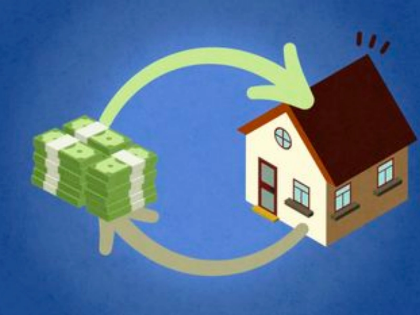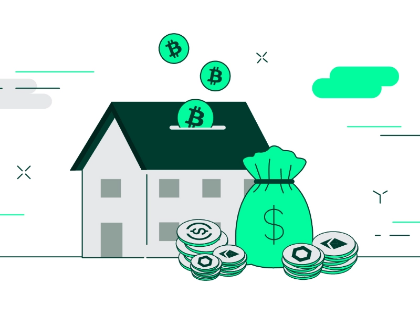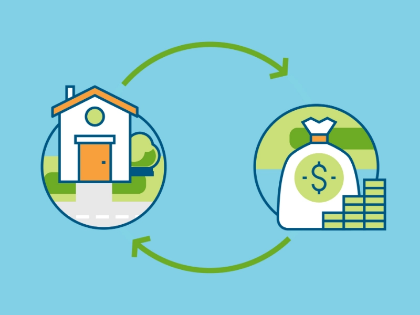Innovations in mortgage technology
Data analytics is being used by lenders to determine trends in mortgages, evaluate risks, and customize products to fit the needs of individual borrowers. This strategy can lower risk exposure while increasing profitability and speeding up growth. Fintech companies provide software solutions and services to assist mortgage lenders in automating their procedures. Because of the elimination of manual procedures, they are able to increase efficiency and lower expenses.
Machine learning (ML) and artificial intelligence (AI)
 The mortgage market is rife with intricate procedures, and staying current with emerging technologies can be challenging. On the other hand, emerging technologies derived from AI and ML can increase productivity and decrease the amount of labor required by humans to do mortgage activities.
By automating processes like document classification and verification, these technologies help lenders become more productive and expedite processing times. They also assist lenders in streamlining their processes and enhancing client support.
AI is also applicable to property valuation, loan monitoring, and underwriting. For mortgage lenders, these enhancements may result in increased profitability and reduced risk. Additionally, they may make it possible for borrowers who were previously ineligible to obtain mortgage financing. By reducing defaults and repurchase requests, technological protections enhance the quality of mortgage securities and boost investor confidence in them.
The mortgage market is rife with intricate procedures, and staying current with emerging technologies can be challenging. On the other hand, emerging technologies derived from AI and ML can increase productivity and decrease the amount of labor required by humans to do mortgage activities.
By automating processes like document classification and verification, these technologies help lenders become more productive and expedite processing times. They also assist lenders in streamlining their processes and enhancing client support.
AI is also applicable to property valuation, loan monitoring, and underwriting. For mortgage lenders, these enhancements may result in increased profitability and reduced risk. Additionally, they may make it possible for borrowers who were previously ineligible to obtain mortgage financing. By reducing defaults and repurchase requests, technological protections enhance the quality of mortgage securities and boost investor confidence in them.
Blockchain Technology for Mortgage Documentation
 Even though the majority of people have only a passing familiarity with Bitcoin, the underlying technology, blockchain, has potential uses in the mortgage sector. MLOs that comprehend the workings of blockchain technology and how it might expedite the mortgage process will be able to cultivate relationships—the most precious resource for their company—and win over clients' trust.
One instance is a simplified mortgage application procedure that enables applicants to complete their forms from any location with an internet connection. Authorized parties can readily access and tamper with the digital document that is produced.
Another illustration is the application of blockchain technology to speed up title transfers between lenders. This lowers the possibility of fraud and does away with the requirement for escrow services. Reducing the need for audits, which can save $500 per loan, also lowers costs.
Even though the majority of people have only a passing familiarity with Bitcoin, the underlying technology, blockchain, has potential uses in the mortgage sector. MLOs that comprehend the workings of blockchain technology and how it might expedite the mortgage process will be able to cultivate relationships—the most precious resource for their company—and win over clients' trust.
One instance is a simplified mortgage application procedure that enables applicants to complete their forms from any location with an internet connection. Authorized parties can readily access and tamper with the digital document that is produced.
Another illustration is the application of blockchain technology to speed up title transfers between lenders. This lowers the possibility of fraud and does away with the requirement for escrow services. Reducing the need for audits, which can save $500 per loan, also lowers costs.
Automated Mechanisms
 The mortgage process is streamlined by automated technologies that handle escrow management, document inspection, and signature verification. They also save money for lenders and borrowers by lowering errors and expediting processing times. Personalized interactions are made possible by automated processes, which raise customer satisfaction levels all around.
Automation increases productivity and lowers risk, but it also needs to be adjusted and monitored to guarantee legal compliance and prevent algorithmic bias. Diverse development teams and responsible data governance are essential for this. Mortgage lenders can draw investor capital into the housing market and provide regular borrowers with access to loans by lowering risk and increasing profitability.
For the mortgage process to remain competitive in an ever-changing economic environment, it must continuously improve. Thankfully, mortgage lenders may accomplish this with the use of state-of-the-art technological solutions like Shape.
The mortgage process is streamlined by automated technologies that handle escrow management, document inspection, and signature verification. They also save money for lenders and borrowers by lowering errors and expediting processing times. Personalized interactions are made possible by automated processes, which raise customer satisfaction levels all around.
Automation increases productivity and lowers risk, but it also needs to be adjusted and monitored to guarantee legal compliance and prevent algorithmic bias. Diverse development teams and responsible data governance are essential for this. Mortgage lenders can draw investor capital into the housing market and provide regular borrowers with access to loans by lowering risk and increasing profitability.
For the mortgage process to remain competitive in an ever-changing economic environment, it must continuously improve. Thankfully, mortgage lenders may accomplish this with the use of state-of-the-art technological solutions like Shape.
Electronic Signatures
 It's likely that you, as a mortgage lender, have automated the loan application process with technology. However, did you know that there's still another option to improve efficiency in the mortgage industry? e-Signatures.
Online mortgage document signatures are made simpler using eSignatures. They enhance security and cut down on paperwork as well. They also aid insurers in processing claims more quickly.
The mortgage business is going through a revolutionary period. It is situated at the crossroads of evolving technology, changing consumer demands, strict legal requirements, and a rising consciousness of environmental, social, and governance (ESG) factors. Future success for mortgage firms will depend on their ability to adapt to these new circumstances. To do that, the appropriate digital mortgage software will be essential. For this reason, working with the top mortgage point-of-sale (POS) provider is crucial.
It's likely that you, as a mortgage lender, have automated the loan application process with technology. However, did you know that there's still another option to improve efficiency in the mortgage industry? e-Signatures.
Online mortgage document signatures are made simpler using eSignatures. They enhance security and cut down on paperwork as well. They also aid insurers in processing claims more quickly.
The mortgage business is going through a revolutionary period. It is situated at the crossroads of evolving technology, changing consumer demands, strict legal requirements, and a rising consciousness of environmental, social, and governance (ESG) factors. Future success for mortgage firms will depend on their ability to adapt to these new circumstances. To do that, the appropriate digital mortgage software will be essential. For this reason, working with the top mortgage point-of-sale (POS) provider is crucial.
APIs
 Although obtaining a mortgage necessitates a significant amount of paperwork, modern technology is streamlining and improving the process. Predictive analytics, digital platforms, and automated systems are some of these tools. Additionally, these tools enhance communication and efficiency between loan officials and applicants.
Through the use of APIs, or application programming interfaces, lenders can swiftly send data by connecting different software systems. They also assist mortgage firms with document indexing, file system organization, and the utilization of image technologies. This enables mortgage companies to concentrate on improving the client experience while freeing up important human resources.
From beginning to end, borrowers anticipate a digitized and user-friendly mortgage procedure. Prioritizing these characteristics will probably give lenders a competitive advantage in the marketplace.
Although obtaining a mortgage necessitates a significant amount of paperwork, modern technology is streamlining and improving the process. Predictive analytics, digital platforms, and automated systems are some of these tools. Additionally, these tools enhance communication and efficiency between loan officials and applicants.
Through the use of APIs, or application programming interfaces, lenders can swiftly send data by connecting different software systems. They also assist mortgage firms with document indexing, file system organization, and the utilization of image technologies. This enables mortgage companies to concentrate on improving the client experience while freeing up important human resources.
From beginning to end, borrowers anticipate a digitized and user-friendly mortgage procedure. Prioritizing these characteristics will probably give lenders a competitive advantage in the marketplace.











